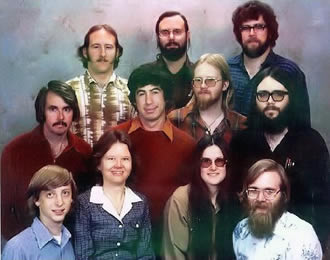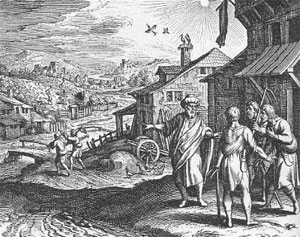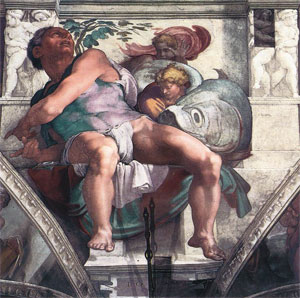Jesus and Jonah:
The Economy and Geography of God's Grace
For Sunday September 18, 2011
Lectionary Readings (Revised Common Lectionary, Year A)
Exodus 16:2–15 or Jonah 3:10–4:11
Psalm 105:1–6, 37–45 or Psalm 145:1–8
Philippians 1:21–30
Matthew 20:1–16
In the world of startup companies, employees who are hired first reap the greatest profits, often in the form of stock options that skyrocket in value when the company goes public. People hired last earn much less. And when it comes to hiring and firing, we're familiar with the Darwinian law of the corporate jungle: last in, first out.
This business model spelled good news for Marc McDonald, pictured in the middle row, third from the left, in this photo of the Microsoft management team taken on December 7, 1978. Hired as Microsoft's first salaried employee in 1976, Marc wore badge #00001. He left the company in 1984 because he said Microsoft had gotten "too big." At the time, Microsoft employed 400 people; today it employs 135,000 people in 139 countries. Marc McDonald will be forever famous as Microsoft's "First Employee."
 |
Microsoft management team, December 7, 1978. |
In the ways of the world, the first are first and the last are last.
In the kingdom of God, things are different. Much different. In the gospel this week Jesus tells a story about a business owner who had his own crazy ideas about the perfect pay day. The punch line of the story shocked his listeners with a radical reversal that subverted conventional wisdom. And just to make his point clear, Jesus repeats the punch line verbatim three times.
In God's kingdom, the first will be last and the last will be first.
The parable of the workers in the vineyard is preceded by a story about a rich young man. When Jesus invited the man to sell his possessions and give his money to the poor, "he went away sad, because he had great wealth." Peter then responded, "Lord, we have left everything to follow you. What then will there be for us?" The rich man kept all that he had; the disciples left all that they had. Jesus assured them: "At the renewal of all things, many who are first will be last, and many who are last will be first" (Matthew 19:30).
Jesus then tells the parable of the workers in the vineyard to elucidate his point. A foreman hired laborers early in the morning for one denarius a day, then more employees successively throughout the day at the third, sixth, ninth, and eleventh hours. A twelve-hour day of manual labor with the "burden of the work and the heat of the day" (Matthew 20:12) is a long day. That evening, the foreman paid the workers, but he did so in an unusual way, "beginning with the last ones hired and going on to the first" (21:8).
Whereas the first workers hired had endured "the burden of the work and the heat of the day" for twelve hours, the workers hired at the eleventh hour worked just one hour. In fact, they had "stood here all day long doing nothing" (20:6). Nonetheless, he paid those who had worked a meager one hour the same as those who had worked twelve hours. They received twelve hours of pay for one hour of work.
Imagine if Microsoft hired you today as employee #135,001, and then after the interview informed you that your salary would be the same as Marc McDonald's, even though you were hired thirty years later and had done nothing at all. You would be thrilled at this compensation package, but Marc McDonald wouldn't be. The shareholders wouldn't be happy either. There would definitely be a lawsuit.
Nor were the laborers who had worked twelve hours at all happy. They rightly thought that they would make more than the lazy people who stood around all day doing nothing and then worked one measly hour. The parable says that "they grumbled against the landowner." Of course they grumbled, why not? But the ways of God are different than the laws of business. And so for the third time Jesus says, "the last will be first, and the first will be last" (20:16).
 |
Parable of the Vineyard, Matthaeus Merian the Elder, 1625–30. |
Jesus isn't talking about labor laws, unemployment benefits, or the minimum wage, although if he lived today I think he might have some sacred satire about executive compensation. Rather, he's contrasting a wildly generous God with life based upon merit. If you're Lutheran you could say this is a contrast of divine grace and human works. Specifically, Jesus is speaking about the end of history and about the character of God.
At the end of history and "the renewal of all things," says Jesus, our human hopes for justice will be fulfilled. There will be reversals. The rich man who kept everything will lose everything he thought he had. The disciples who gave up everything will gain everything: "Everyone who has left houses or brothers or sisters or father or mother or children or fields for my sake will receive a hundred times as much and will inherit eternal life. Many who are first will be last, and many who are last will be first" (19:29). Although parables often elucidate spiritual truths, and do so with exaggeration, here I think Jesus is making a very literal point — at the end of history justice will prevail and roles will reverse.
Jesus is also speaking about the character of God. He's a God who pays workers a full day's wage for one hour of work. He contrasts this lavish generosity of God's grace with the meritocracy that characterizes so many human relationships. He cut to the quick when he responded to the grumblers: "Are you envious because I am generous?" (20:15). The Jesus Way, in other words, is a way of grace and not merit, status reversal instead of status reverence, undeserved generosity rather than pay for services rendered.
The story of Jonah amplifies this parable of Jesus. Jonah does for geography what Jesus did for economy. When God had compassion on the pagan Ninevites, Jonah complained bitterly in words that echo the grumblers in Jesus's parable: "I knew that you were a gracious and compassionate God, slow to anger and abounding in love, a God who relents from sending calamity" (Jonah 4:2).
God's prophetic call had come to Jonah, telling him to go to pagan Nineveh and preach a message of repentance. But he refused and fled 750 miles in the opposite direction. Nineveh was east of Palestine whereas Tarshish was west, probably in southern Spain. It's easy to criticize another person's disobedience, even a flagrant disobedience like that of Jonah, until we know or experience their own situation (conversely, we easily forgive our own lapses).
Consider what God asked Jonah to do. Nineveh was the capital city of Assyria, Israel's traditional enemy and eventual conqueror. With a population of 120,000 people, some classical accounts say that it was the largest city in the world in its day. The text tells us that its pagan sinfulness was legendary, as was its cruelty: “It was the people which scorched its enemies alive to decorate its walls and pyramids with their skin.”1 God asked Jonah to go to this city and preach repentance. It was like asking a French person to go to Berlin to preach repentance in 1942. The task felt impossible, and Jonah fled.
Jonah was not just fleeing an unpleasant calling; he was “fleeing from the Lord” (1:3), a fact which he freely admitted to the sailors on board the ship he had hopped (1:10). He then descended into a suicidal death wish (the first of three such death wishes: 1:12, 4:3, 4:8). Remarkably enough, and here is a prophetic word of grace for us today, God did not desert Jonah to his disobedience or give him up to his own poor choices. Instead, Jonah 1:7 tells us that “the Lord provided.” The provision was a fish that swallowed, saved and then vomited Jonah back on shore. Sometimes God's gracious provision does not even wait for us to turn around; he even takes a suicidal death wish like Jonah's and turns it into an occasion of grace. So Jonah was saved.
 |
Jonah, by Michelangelo, 1511. |
God's prophetic word came a second time to Jonah and this time he obeyed. He traveled to Nineveh and preached to Israel's pagan conquerors. It took three days, and then the unthinkable happened. The city famed for cruelty and wickedness believed the message and repented. The king proclaimed a national day of civic repentance. Nineveh, we read, despite its wickedness, cruelty and enemy status, was a city “important to God” (3:3), a city for which God had great compassion (3:10), a city that attracted his tender concern (4:11).
God did not desert Jonah to his own disobedience. This God pays a full day's pay to people who stood around all day doing nothing. And neither did he desert a pagan enemy city like Nineveh.
Like the workers in the vineyard who bore "the burden of the work and the heat of the day" and grumbled about the boss's extravagant generosity, Jonah complained bitterly about God's lavish love toward a sworn enemy. His disobedience to God's initial call was one thing, perhaps understandable due to the magnitude and improbability of the task, but there's something dark in his second failure: why do we sometimes prefer misfortune for others, divine judgment, rather than God's shalom?
We know that in some sure and certain way God loves all people equally. But the parable of the workers in the vineyard that demotes the first to last and elevates the last to first, along with Jonah who complained about God's tender love for Israel's bitter enemy, remind us that he somehow has a special love for the least, for those whom we normally exclude, reject, and even hate. The geography of divine grace that embraces Nineveh and the economy of his love that pays a full day's wage for one hour of work confound our puny and parsimonious human metrics that complain about divine generosity instead of celebrating it.
For further reflection:
* Watch the Danish film Babette's Feast (1988). The story is set in the late nineteenth century and takes place in a small fishing village on the dank and dreary Jutland coast of Denmark. A band of dour Christians learn the meaning of God's extravagant grace from a most unlikely source.
*
What are today's "cities important to God" (Jonah 3:3) that we're tempted to dismiss or ignore?
* Have you ever regretted God's favor to an undeserving person, like the workers hired first or like Jonah?
* What is harder for you: receiving God's generosity for yourself or extending it to others?
[1] Jacques Ellul, The Judgment of Jonah (Grand Rapids: Eerdmans, 1971), p. 26.
Image credits: (1) CodingHorror.com; (2) Biblical Art on the WWW; and (3) Web Gallery of Art.





